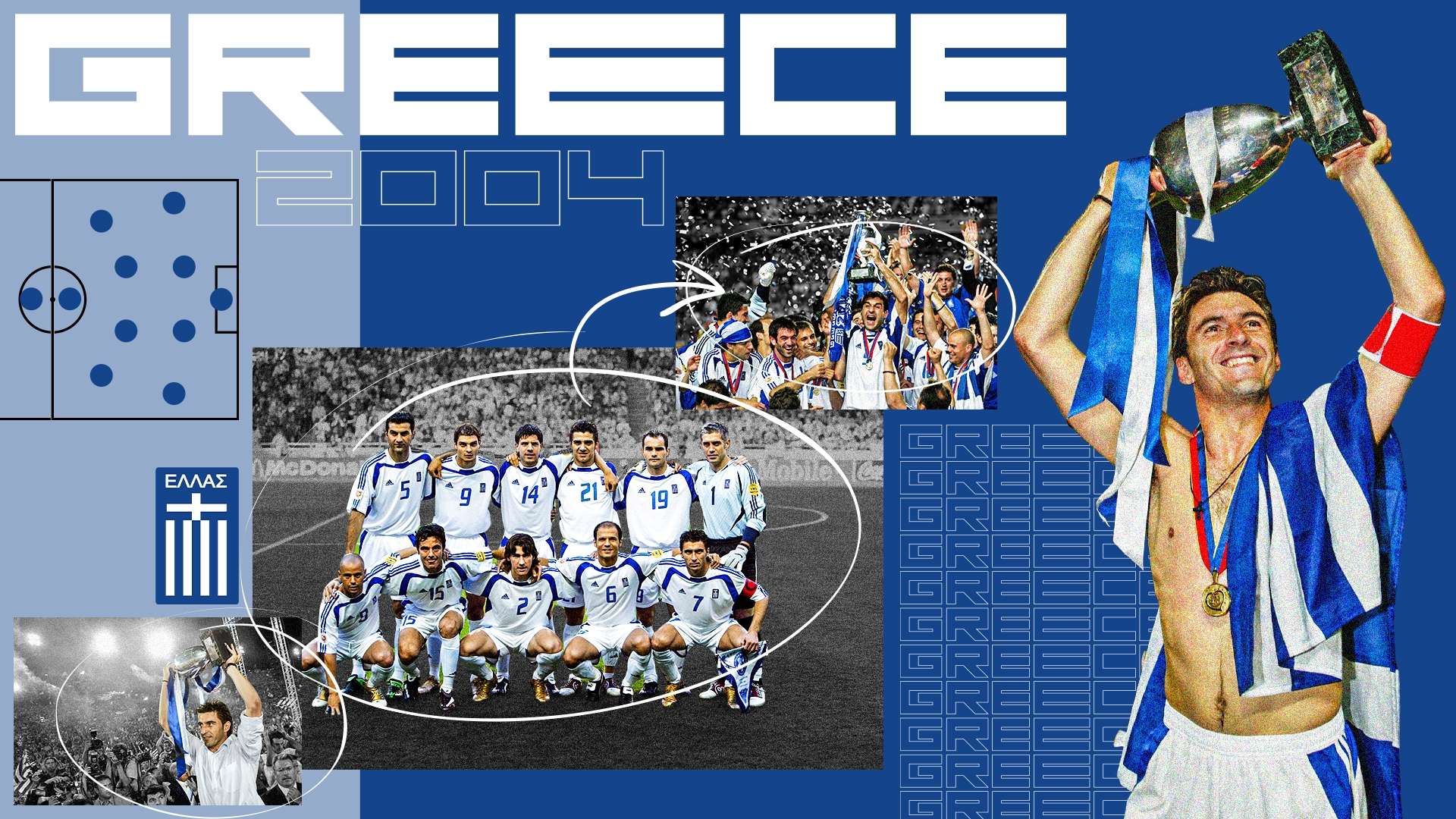"The target at the start was to win a game. That would have counted as a success: winning just once."
Greece were a footballing minnow in every sense of the word ahead of Euro 2004, as perfectly illustrated by squad member Vasilis Tsiartas. They had failed to qualify for a European Championship since 1980, which was also their only previous visit to the tournament and where they had failed to win a match.
Their sole World Cup appearance at USA 1994, meanwhile, had ended with three defeats, no goals scored and 10 conceded.
It is safe to say that nobody expected Otto Rehhagel's team to take the title upon their arrival in Portugal 10 years later, with the bookmakers pricing the Ethniki as a rank outsider at 80/1.
They stunned the world, however, with a 1-0 win over the hosts in the final that will go down as one of sport's biggest ever shocks.
"The Greeks have made football history," German coach Rehhagel proclaimed after lifting the Henri Delaunay trophy. "It's a sensation.
"There are always surprises. Remember North Korea beat Italy in the 1966 World Cup in England? This time we are the surprise."
Despite losing their first two qualifying matches for the tournament to Spain and Ukraine, Greece won their next six to book their flight to Portugal as group winners.
It was during this run that signs emerged that Greece would not simply be making up the numbers should they qualify for the final tournament, with their 1-0 win on the road against Spain proving their mettle while forcing La Roja into a play-off to reach the finals themselves.

Such low-scoring affairs would become a staple of Greece's run throughout the competition, with Rehhagel's side scoring just eight times in their eight qualifying matches while only conceding on four occasions, as they showcased a new-found defensive solidity.
Both central defenders, Traianos Dellas and Michalis Kapsis, were highly physical with strong aerial capabilities that allowed the team to sit deep and deal with crosses into the box, while Antonios Nikopolidis was a reliable goalkeeper.
Led by captain Theo Zagorakis, a trio of defensively-minded midfielders – including Angelos Basinas and Kostas Katsouranis – provided a shield in front of the back four and numbers to strangle opponents in the middle of the park.
Continuing the theme of physicality, Rehhagel generally deployed 6'3'' Angelos Charisteas as the lone striker in attack, with the target man excelling both in the air and at holding the ball up.
Left-back Takis Fyssas described Greece's squad at the 2004 tournament as one that was devoid of superstars, but which functioned on strong work ethic and discipline.
"We only had the weapons we had been given," Fyssas, who is now the Greece national team's sporting director, said to ESPN.
"We did not have a Zidane, or Simao, or Cristiano Ronaldo. We only had hard work, sacrifice, determination and that family spirit. What we did is the same as how Atletico Madrid play now."
How Maradona inspired Napoli to a miracle Scudetto
How unfancied Nigeria beat Ronaldo & Crespo to win Olympic gold
How Giroud fired Montpellier to stunning Ligue 1 title
Greece's first opponents at Euro 2004 did have Ronaldo, though, as they squared up against Portugal in the opening match of the tournament.
Ronaldo scored but it was a 93rd-minute consolation goal as the Greeks silenced 50,000 home fans in Porto with a famous 2-1 win – reaching their target number of victories for the tournament in their very first outing.
"That win released us," Tsiartas said. "We felt free."
Charisteas' equaliser against Spain in their second group game meant Greece would just need a victory against winless Russia to progress to the quarter-finals.
Despite going down 2-0 in the opening minutes and only managing to pull one goal back, Rehhagel's side still managed to qualify for the knockout stages as Portugal defeated Spain to send their neighbours crashing out.
Greece next faced a last-eight contest against a France squad featuring Zinedine Zidane, Thierry Henry, Patrick Vieira and Robert Pires among others, with the defending champions considered near-certainties to progress.
However, a second-half counterattack resulted in Charisteas heading past Fabien Barthez for the only goal of the game, as Greece held on to set up a semi-final match against Czech Republic.
 Getty
GettyWith the Czechs' attacking talent at the peak of its powers, players such as Pavel Nedved, Milan Baros and Jan Koller made them hot favourites to progress to a second Euros final in three tournaments.
However, Greece stood firm through 90 minutes before Dellas scored the only silver goal in international football history when he headed in Tsiartas' corner in extra time to send Greece into the final, where they would again meet Portugal.
More than 100,000 people crowded Athens' Omonia Square in celebration, while expats stopped traffic in Sydney, Australia – but surely Portugal could not make the same mistake as in the opening match?
With the likes of Ronaldo and Luis Figo in attack, and 63,000 crazy fans supporting the side at Lisbon's Estadio da Luz, the trophy was there for the taking.
The hosts had 17 shots, 10 corners and 58 per cent possession, but it was not enough to breach the resolute Greece back four. With their only corner, and one of only four shots in the match, Charisteas headed in the winner to send the entire Greek nation into delirium.
Greece won all three of their knockout matches by a 1-0 scoreline, with headed goals that were all similar in design and concept. Five Greek heroes were named in the Team of the Tournament, including Zagorakis, who also took home the prize for Player of the Tournament.
It was tactical mastery by Rehhagel, who showed that hard work, patience, discipline and clinical finishing can triumph over skill, talent and ability.
Greece were no longer an irrelevant football nation having secured an achievement that would forever define their existence in the game.